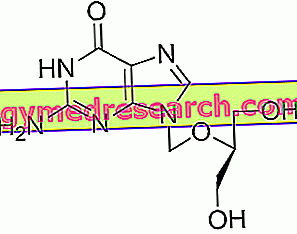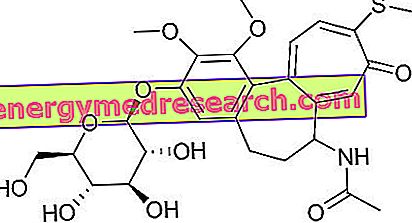Ganciclovir is an antiviral drug capable of interfering with DNA replication of viruses.

Ganciclovir - Chemical Structure
From the chemical point of view, ganciclovir is an analogue of deoxyguanosine, one of the nucleosides that makes up DNA.
Ganciclovir is marketed as pharmaceutical formulations suitable for ocular and intravenous administration.
Indications
For what it uses
The use of ganciclovir is indicated for:
- Treatment and prevention of infections caused by cytomegalovirus in patients with impaired immune defenses (intravenous administration);
- Prevention of cytomegalovirus infections following organ transplants (intravenous administration);
- Treatment of superficial eye infections caused by viruses (ocular administration).
Warnings
Before starting therapy with intravenous ganciclovir, blood tests should be performed to determine blood levels of blood cell and hemoglobin cells.
Also, before starting treatment with ganciclovir, you should inform your doctor if you are in any of the following conditions:
- If you suffer from hemocytopenia (ie if you have low levels of blood cells);
- If you have had radiation therapy;
- If you suffer from kidney problems.
Because intravenously administered ganciclovir can have long-term toxic effects on the reproductive system, the drug should be used with extreme caution in children and adolescents and only in cases of actual need.
The use of ganciclovir administered via the eye is not recommended in children and adolescents under 18 years of age.
Before administering ganciclovir by the eye, it is necessary to remove the soft contact lenses if they are used.
If other ophthalmic drugs are being taken during ocular therapy with ganciclovir, the latter should be administered at least 15 minutes after the administration of the other ophthalmic drug.
Ganciclovir can cause side effects that can alter the ability to drive and / or use machinery, therefore, great care should be taken.
Interactions
Before starting treatment with intravenous ganciclovir, you must tell your doctor if you are taking any of the following medications:
- Probenecid, a drug used in the treatment of gout;
- Zidovudine, zalcitabine and didanosine, other antiviral drugs used in AIDS therapy;
- Cidofovir, foscarnet and other antiviral drugs;
- Imipenem and cilastatin in combination, drugs used to treat certain types of infections;
- Mycophenolate mofetil, an immunosuppressive drug;
- Trimethoprim, an antibiotic;
- Sulfonamides, other antibiotics;
- Dapsone, a drug used in the treatment of leprosy;
- Amphotericin B and other antifungal drugs;
- Vincristine, vinblastine and adriamycin, anticancer drugs;
- Hydroxyurea, a drug used in the treatment of leukemias.
In any case, it is still advisable to inform your doctor if you are taking - or have recently been - any type of medication, including non-prescription medicines and herbal and / or homeopathic products.
Side effects
Ganciclovir can cause various types of side effects, although not all patients experience them. This depends on the different sensitivity that each individual has towards the drug. Therefore, it is not said that the adverse effects occur all with the same intensity in each patient.
The main side effects that can occur during ganciclovir therapy are listed below.
Blood and lymphatic system disorders
Treatment with ganciclovir may cause:
- Leukopenia, ie the decrease in the number of leukocytes in the blood;
- Neutropenia, ie the decrease in the number of neutrophils in the bloodstream;
- Anemia, ie the decrease in the amount of hemoglobin in the blood;
- Piastrinopenia, ie the decrease in the number of platelets in the bloodstream;
- Pancytopenia, which is the decrease in the levels of all blood cells.
Kidney and urinary tract disorders
Ganciclovir therapy may cause urinary tract infections, renal impairment, decreased renal creatinine clearance, haematuria (presence of blood - visible or not - in urine) and renal failure.
Gastrointestinal disorders
Treatment with ganciclovir may induce:
- Diarrhea;
- Nausea;
- He retched;
- Dyspepsia;
- Dysphagia;
- Constipation;
- Flatulence:
- Abdominal distension;
- Pancreatitis.
Respiratory tract disorders
Ganciclovir therapy can cause dyspnea and cough.
Nervous system disorders
Treatment with ganciclovir may cause:
- Decreased appetite;
- Anorexia;
- Headache;
- Alteration of the sense of taste;
- Hypoaesthesia;
- paresthesia;
- Peripheral neuropathy;
- Rigidity;
- Tremors;
- fatigue;
- Asthenia;
- dizziness;
- Convulsions.
Psychiatric disorders
Ganciclovir therapy can cause confusion, anxiety, depression, thought changes, agitation, psychotic disorders and insomnia.
Hepatobiliary disorders
Treatment with ganciclovir can cause changes in liver function and increased blood levels of alkaline phosphatase and aspartate aminotransferase.
Eye disorders
Ganciclovir therapy may cause:
- Macular edema;
- Retinal detachment;
- Eye pain;
- Conjunctivitis;
- Visual disorders.
Musculoskeletal disorders
Treatment with ganciclovir can cause myalgia, arthralgia and muscle cramps.
Skin and subcutaneous tissue disorders
During ganciclovir therapy, the following may occur:
- Dermatitis;
- Itch;
- Urticaria;
- Dry skin;
- Alopecia;
- Injuries of the oral cavity.
Other side effects
Other side effects that may occur during treatment with ganciclovir are:
- Allergic reactions, even serious, in sensitive subjects;
- Temperature;
- Malaise;
- Sepsis;
- viraemia;
- bacteraemia;
- Cellulite;
- Oral candidiasis (thrush);
- Ear pain;
- Deafness;
- Night sweats;
- Increased blood creatinine levels;
- Weight loss;
- arrhythmias;
- Hypotension;
- Male infertility.
Furthermore, when ganciclovir is administered intravenously, reactions at the injection site may occur.
Side effects of ganciclovir administered via the eye
During the use of ganciclovir by the eye, undesirable effects may occur, such as:
- Temporary burning or stinging in the eyes;
- Temporary eye irritation;
- Temporary blurred vision;
- Inflammation of the cornea;
- Redness of the conjunctiva.
Overdose
If an overdose of intravenous ganciclovir is administered, symptoms may occur affecting the blood, kidneys, liver, stomach, intestine and nervous system. The overdose treatment is supportive.
In any case, if a ganciclovir overdose is suspected - both intravenously and via the eye - it is necessary to immediately inform the doctor.
Action mechanism
Ganciclovir performs its antiviral action by interfering with DNA replication of viruses.
More in detail, ganciclovir inhibits viral DNA polymerase, the enzyme responsible for the synthesis of virus DNA.
Furthermore, since ganciclovir has a chemical structure similar to deoxyguanosine (one of the nucleosides that makes up DNA), it replaces it in the new viral DNA strand that is forming preventing it from continuing to stretch. In this way, the DNA replication of the virus is blocked.
Mode of Use - Posology
Ganciclovir is available for intravenous administration (in powder and solvent form for solution for infusion) and for ocular administration in the form of an ophthalmic gel.
Below are some indications on the doses of ganciclovir usually used in therapy.
Intravenous administration
Intravenous ganciclovir is used exclusively in hospitals and is administered only by specialized personnel.
The amount of drug to be administered and the duration of the treatment are established by the doctor according to the weight, the state of health and the patient's response to the therapy.
Patients must undergo regular blood tests throughout ganciclovir treatment.
Patients with kidney problems may need to adjust the dose of ganciclovir administered.
Administration by eye
Ocular ganciclovir should be taken strictly following the directions given by the doctor.
Generally, a drop of gel is recommended three to five times a day. The duration of treatment should not exceed 21 days.
Ophthalmic gel should not be used in children and adolescents under 18 years of age.
Pregnancy and breastfeeding
Due to the possible damage it can cause to the fetus, ganciclovir should not be used during pregnancy, except in the case where the doctor does not consider it absolutely necessary and the potential benefits expected for the mother are greater than the potential risks to the fetus.
Ganciclovir should not be used by mothers who are breast-feeding due to the severe damage it can cause to the baby.
Furthermore, for the duration of treatment with ganciclovir, women in therapy must take adequate contraceptive measures to prevent the onset of possible pregnancies.
On the other hand, men treated with antiviral must adopt barrier contraceptive methods for the duration of treatment with ganciclovir and for a period of at least ninety days from the end of the same.
Contraindications
The use of ganciclovir is contraindicated in the following cases:
- In patients with known hypersensitivity to the same ganciclovir;
- In patients with known hypersensitivity to aciclovir, valaciclovir or valganciclovir (other antiviral drugs);
- During breastfeeding.



